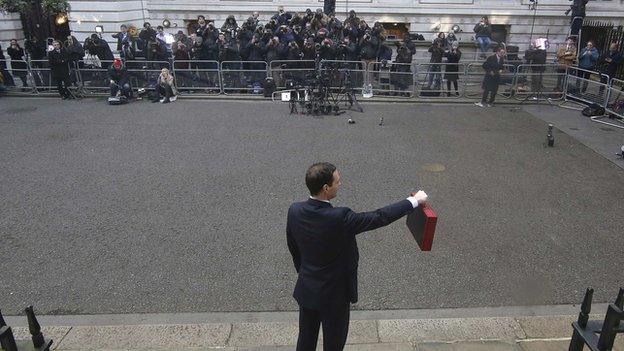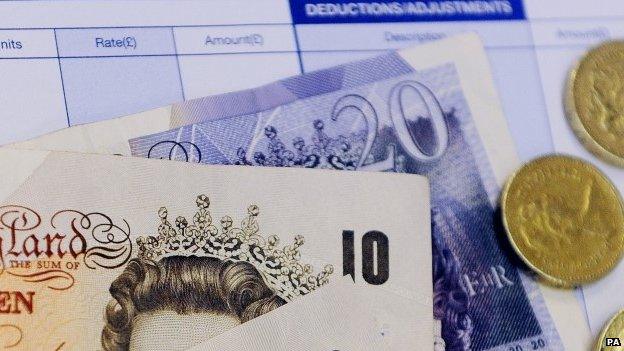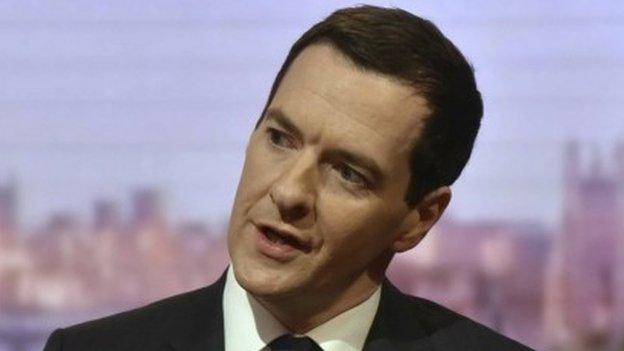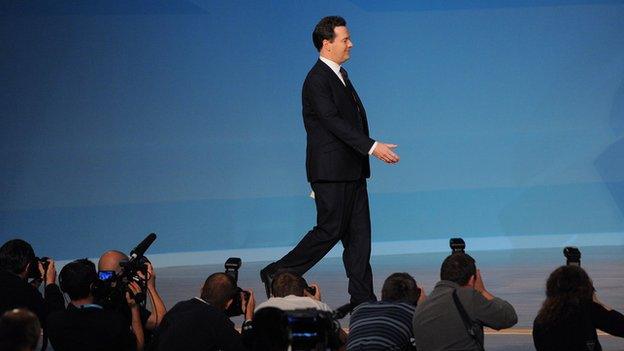Summer Budget 2015: Osborne eyes pain now for gain later
- Published

This is George Osborne's second budget in four months but the first as part of a Conservative government
When George Osborne stands up on Wednesday to deliver the first Conservative Budget in almost 20 years, we should bear in mind what David Cameron last month told the first Conservative cabinet in almost 20 years.
The prime minister said: "I want everyone around this table to remember who we're for. Every decision we take, every policy we pursue, every programme we initiate, never forget: we're here to give everyone in our country the chance to make the most of their life.
"The pundits might call it 'blue-collar Conservatism', others being on the side of hardworking taxpayers. I call it being the real party for working people: giving everyone in our country the chance to get on, with the dignity of a job, the pride of a pay cheque, a home of their own and the security and peace of mind that comes from being able to support a family.
"And just as important - for those that can't work, the support they need at every stage of their lives."
The task for the chancellor will be to square his boss's rhetoric with the substantial spending cuts that he intends to announce. The Conservatives were elected on a promise of cutting a further £12bn from the welfare budget.
Welfare cuts
In the Budget we will find out where the axe will fall. Tax credits and housing benefit are expected to take most of the pain.
Now when faced with cuts of this size, Conservatives frequently accuse journalists like me of exaggerating the potential impact.

The government wants more firms to pay the living wage
They say the media are as bad as government departments in talking up the consequences of spending reductions that ultimately get absorbed with less hullaballoo than predicted. But the cuts that Mr Osborne announces will be significant and tough. They cannot be otherwise.
And he has every reason to give us most of the detail now. This is the first Budget in a five-year Parliament. Mr Osborne will want to get as much pain out of the way as soon as he can. He will want to use the mandate and momentum of a newly-elected government to carry out its manifesto commitments.
He will want to make the most of a rudderless Labour Party. He will want to crack on with the cuts now so that, if everything goes to plan, he has a surplus to spend ahead of the next election in 2020. When, perhaps, he may be leading the Conservative Party.
But £12bn is still £12bn and the cuts will be felt by low-paid people who you might call, say, "hardworking taxpayers" who the government wants to support "at every stage of their lives".
And remember - the Conservatives want these people's votes to be as blue as their collars. As Mr Osborne told Andrew Marr at the weekend: "We've got to make sure this is a fair Budget, that we're all in this together."
So how may Mr Osborne try to square the circle?
Moral arguments
First, he will make the moral case for cutting tax credits, arguing that they subsidise employers who pay too little and provide disincentives to work more hours. He will urge more firms to pay the living wage and - some hope - perhaps even provide them with incentives to do so.

The chancellor is expected to contrast the UK's fiscal position with that of Greece
He will almost certainly cut taxes for the less well off by once again raising the threshold at which income tax is paid. He will highlight his manifesto commitment to raise the minimum wage in line with that threshold.
Second, Mr Osborne will almost certainly hit the rich. He is promising a £5bn crackdown on tax avoidance and tax planning, something that affects only rich people and companies. He has hinted that he might change the rules and fees paid by wealthy non-doms.
He has already promised to increase taxes on the pension contributions of higher earners to pay for an inheritance tax cut. He could always tax those pension contributions even further. If he was feeling even more radical, the chancellor could commission work on creating a new council tax band for expensive homes, a kind of watered-down Tory mansion tax.
All he needs is enough to generate a counter-narrative that the rich are taking some of the pain.
Third, he will argue the spending cuts are needed to keep the recovery secure, to keep cutting the deficit so that Britain is further protected from economic shocks such as Grexit. Expect to hear quite a lot about Greece.
So this is George Osborne's big moment, his first Budget free from Liberal Democrat constraints, the first in a Parliament that he wishes to end as leader of the Conservative Party.
He needs to get enough pain out of the way early to ensure the impact is not felt at the next election. But he needs to do so without inflicting lasting damage on his party. That is some circle to square.
- Published5 July 2015

- Published5 July 2015

- Published6 July 2015
